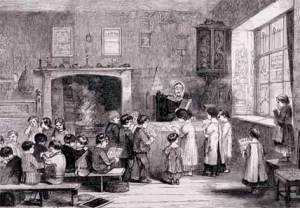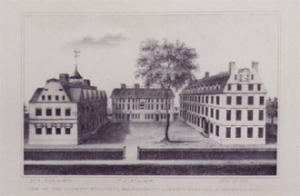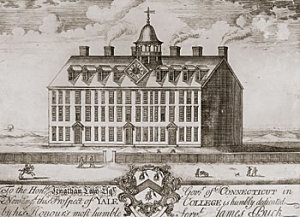My last few posts about the early Puritans have contained controversy, as they attempted to deal with disagreement in the Massachusetts colony. They had to decide what to do with people like Roger Williams, Anne Hutchinson, and the Quakers who showed up later. Some of their decisions may have been just, while others (such as hanging Quakers) clearly were not.
Let’s leave most of that controversy behind today and examine the Puritan desire to educate their communities. In a document called New England’s First Fruits, written in 1643 to explain what they were doing with education, we get this bedrock philosophical foundation for the need for education:
After God had carried us safe to New England, and we had builded our houses, provided necessaries for our livelihood, rear’d convenient places for God’s worship, and settled the Civil Government; One of the next things we longed for, and looked after was to advance Learning, and to perpetuate it to Posterity; dreading to leave an illiterate Ministry to the churches, when our present Ministers shall lie in the dust.
 How did they go about this for the different levels of education? First, considering they lived pretty much in small communities, they tended to organize what they called “common” schools. These schools usually met in the church building, since it was at the center of the community; often the local minister doubled as the schoolteacher. Educational standards were set by local committees who were also members of the church.
How did they go about this for the different levels of education? First, considering they lived pretty much in small communities, they tended to organize what they called “common” schools. These schools usually met in the church building, since it was at the center of the community; often the local minister doubled as the schoolteacher. Educational standards were set by local committees who were also members of the church.
It’s important to understand that the Puritans never conceived of any type of education that wasn’t clearly Biblical in orientation.
Education acts passed by the legislature in the 1640s required parents to ensure their children were properly instructed in the Christian faith, reading proficiency, the laws of the colony, and in a vocation (often through an internship with another member of the community who had a business). Parents were even warned that if they didn’t take this responsibility seriously, their children might be placed in another home to make sure they got the education they needed.
A more specific act, often referred to as The Old Deluder Satan Act, passed the legislature in 1647. It was given that name because the Puritans believed an uneducated person, particularly one who was ignorant of the Scripture, could be more easily deceived by Satan and fall into error.
This act required towns with at least fifty families to set up common schools. Towns with at least one hundred families had to set up a grammar school, which was a higher level of learning. The decision for how to fund these schools was put in the hands of the locality; the citizens of the town could determine if they wanted to pool their money for them (i.e., taxes) or charge tuition. Or both. The key, though, is that is was the locality’s choice; it was not imposed by a higher authority.
Neither did parents have to put their children in these schools; they remained free to educate at home, if they chose to do so.
What about those who sought a higher education? In 1636, plans were put into effect to set up a college. Mr. John Harvard offered his library to help it get started; as you may guess, it was named after him.
 It’s fascinating to review Harvard’s Rules and Precepts in its initial years. Here’s one of the precepts:
It’s fascinating to review Harvard’s Rules and Precepts in its initial years. Here’s one of the precepts:
Let every Student be plainly instructed, and earnestly pressed to consider well, the maine end of his life and studies is, to know God and Jesus Christ which is eternal life, John 17:3 and therefore to lay Christ in the bottome, as the only foundation of all sound knowledge and Learning. And seeing the Lord only giveth wisedome, let every one seriously set himself by prayer in secret to seeke it of him Prov. 2,3.
 In 1701, Connecticut set up its first college, Yale. Like Harvard, the original intent was to give students a solid foundation in the faith as they went into the world to do God’s will. Early instructions at Yale included the following:
In 1701, Connecticut set up its first college, Yale. Like Harvard, the original intent was to give students a solid foundation in the faith as they went into the world to do God’s will. Early instructions at Yale included the following:
Every student shall consider the main end of his study . . . to know God in Jesus Christ and answerable to lead a Godly, sober life.
All scholars shall lead religious, godly and blameless lives according to the rules of God’s Word, diligently reading the Holy Scriptures, the fountain of light and truth; and constantly attend upon all the duties of religion, both in public and secret.
Seeing God is the giver of all wisdom, every scholar, besides private or secret prayer, . . . shall be present morning and evening at public prayer in the hall at the accustomed hour.
Not bad for beginnings. Now, the best aims don’t always come to fruition. Certainly not all the students followed those principles; yet it’s significant to take into account the goals of the founders of these institutions.
Yale continued as a bulwark of Christian education at least through the first half of the nineteenth century, aided by leadership from men such as Timothy Dwight and Nathaniel Taylor. Revivals occurred at Yale regularly.
Not so for Harvard, which, by the turn of the nineteenth century, had been taken over by Unitarians who denied the deity of Jesus.
This points to a hard truth: one must stay vigilant to keep education on track. The temptation remains today for Christian colleges and universities to water down the Gospel and try to fit into the trends of the times. We do so at our spiritual peril.
Let’s at least give the Puritans credit for putting into operation an educational system that sought to honor God first.
